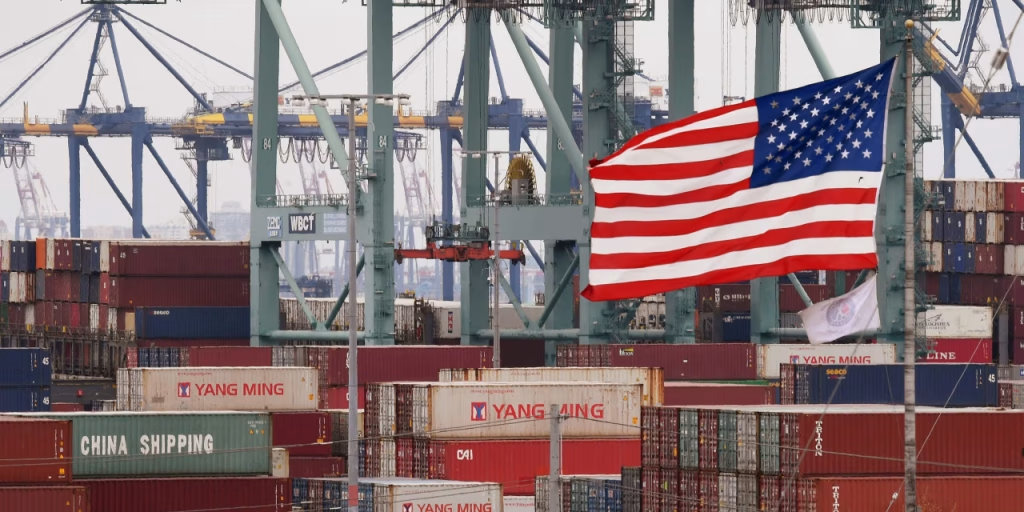Gold prices soared to an all-time high on Monday, reflecting heightened investor anxiety amid growing tensions between President Donald Trump, the Federal Reserve, and key global trading partners.
The surge in the precious metal came alongside a weakened U.S. dollar and mixed performances in global stock markets, painting a picture of economic unease and geopolitical volatility.
With many financial markets still closed in observance of the Easter holiday, trading was relatively light. However, the atmosphere remains tense as investors brace for a wave of economic data this week that may shed light on the early consequences of the Trump-era tariff policies.

The main concern rattling markets is Trump’s continued tariff offensive. Japan, one of the world’s largest economies, is currently in talks with Washington, hoping to avoid the worst of the sweeping import taxes. Yet, China—facing some of the steepest U.S. tariffs, with rates as high as 145% on various goods—has drawn a firm line.
READ ALSO: Pope Francis Dies at 88, Vatican Confirms
On Monday, China issued a stern warning to other nations, cautioning them not to strike deals with the U.S. that might undercut Beijing’s own interests.
In a statement from the Ministry of Commerce, officials accused other countries of seeking “temporary selfish interests” at the expense of global cooperation. “To seek the skin of a tiger,” the statement said, “is to invite harm. Such a path will ultimately fail and hurt all parties involved.”

Despite these warnings, Trump claimed optimism about the ongoing negotiations. Speaking last Thursday, he said, “Yeah, we’re talking to China… I think we’re going to make a very good deal.”
READ ALSO: Trump Weighs Major Cuts to U.S. Diplomatic Presence in Africa
Another key source of volatility is the simmering tension between Trump and Federal Reserve Chair Jerome Powell. The president recently criticized Powell for suggesting that tariffs would likely lead to a temporary rise in inflation. Powell also noted that interest rate cuts were not currently on the table.
Trump’s response was characteristically sharp, telling reporters that if he wanted Powell out of the job, “he’ll be out of there real fast, believe me.” These remarks have sparked concerns about the Fed’s independence, an institution historically shielded from political influence.

Powell, for his part, reaffirmed his intention to serve out his full term, emphasizing that the Fed’s independence is not just tradition—it’s “a matter of law.” The rhetoric has weighed heavily on the dollar, which slid against other major currencies. The Japanese yen and euro made notable gains, with traders seeking stability in uncertain times.
As geopolitical and economic uncertainties deepen, investors have increasingly turned to traditional safe-haven assets. Gold, in particular, broke above $3,384 per ounce—a fresh record high—buoyed not only by global tensions but also by the sliding dollar.
Meanwhile, global equity markets painted a mixed picture. Tokyo’s stock exchange struggled under the pressure of a strengthening yen, while markets in Taipei also edged lower. However, stocks in Shanghai, Seoul, Singapore, Manila, and Jakarta posted gains, reflecting cautious optimism in parts of Asia.

Oil prices fell, driven by growing fears of a global demand slowdown. Traders are also watching closely for the release of April’s global manufacturing data, which is expected to offer the first concrete indicators of how Trump’s tariff strategy is affecting industrial output.
French Finance Minister Eric Lombard didn’t mince words when commenting on the situation: “Donald Trump has hurt the credibility of the dollar with his aggressive moves on tariffs — for a long time.” He added that any interference with the Fed’s independence could cause further damage in the bond market.
Echoing these concerns, Chicago Fed President Austan Goolsbee stated on CBS’s Face the Nation, “There’s virtual unanimity among economists that monetary independence from political interference is really important.”

Stephen Innes of SPI Asset Management summed up the broader sentiment in the investment community: “One thing that’s absolutely clear — and no longer debatable — is that the reputational hit to the U.S. brand is real, and it’s not fading quietly into the next news cycle. Investors, allies, and even central banks are starting to bake in the idea that American policymaking—both fiscal and monetary—is now a geopolitical variable, not a given.”
With safe-haven assets on the rise and markets remaining jittery, this week’s data could prove pivotal. Whether the global economy can weather the twin storms of trade conflict and political interference in monetary policy remains to be seen—but one thing is clear: investors are no longer betting on business as usual.
Discover more from Scoop Hub
Subscribe to get the latest posts sent to your email.

